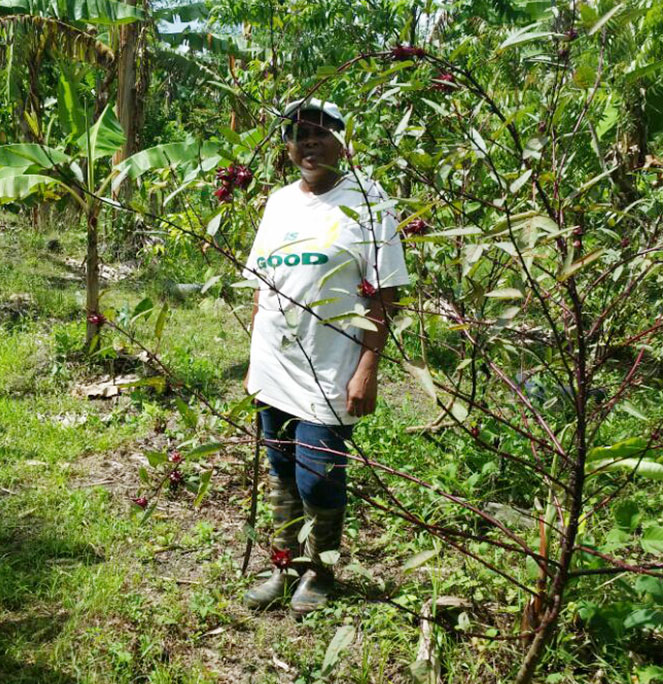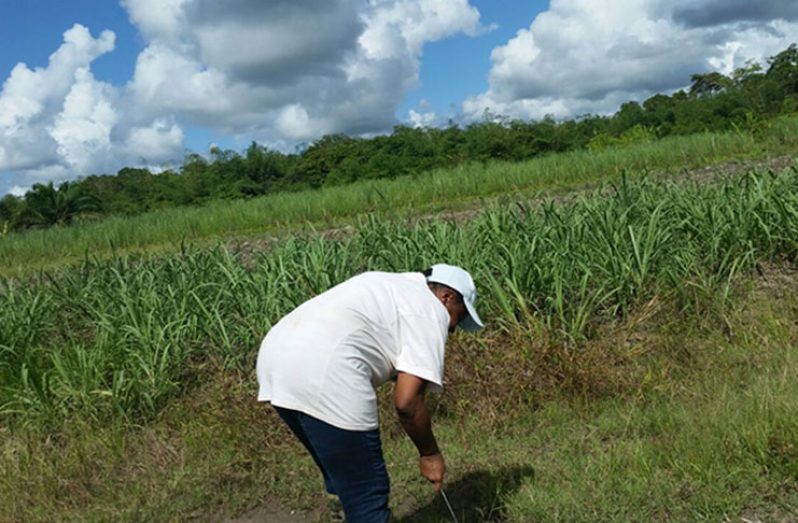By Wendella Davidson
AT an early age, Rosamond Miller, developed a penchant for farming, maybe because she was born into a family where her grandfather, uncle, mother and father did some amount of farming for a living.
In addition, her home village of Stanleytown, on the West Bank of Demerara, is a known farming community and most of the villagers also rear a variety of livestock
Rosamond thus grew up with a love for animals, along with a habit of helping out in the little kitchen garden her mother planted to help supplement the household with vegetables. So, when, in 1982 she made the decision to spend two years as a student at the Guyana School of Agriculture, which then had as its principal, Winslow Davidson, it was of no surprise to her family members or residents of the community.
Rosamond told the Pepperpot Magazine during an interview that she thoroughly enjoyed every moment of what she described as “two invaluable years” spent at the GSA. At the end of her tenure, as a result of the knowledge she gained, she was able to lend much-needed assistance to relatives, friends and others in the community whenever their livestock had minor illnesses.
In addition to `dabbling’ with husbandry, Rosamond said she soon had her own small herd of pigs, sheep and cows and sold milk from the cows which contributed to her income.
 GOLDEN OPPORTUNITY
GOLDEN OPPORTUNITY
But Rosamond recalled that it was when Partners of the Americas, a non-governmental organisation (NGO) paid a visit to the Stanleytown community to educate residents about the usefulness of using shade houses to increase yield and protect the cultivated crops, several individuals bought into and embraced the idea, including Rosamond.
Partners of the Americas subsequently assisted the interested farmers by gifting them with the plastic material, fertiliser and plant seedlings and from thereon she became more engrossed into farming.
“I first started growing the pakchoi, celery and peppers. I used to do it in pots and discarded containers using earth but with the shade house, I was introduced to the use of paddy husk mixed with sand. I was surprised at the result; it was good,” she said.
“When I tried out the shade house, I started with lettuce but then I noticed my yields were much more, to the extent that I started to share among relatives and friends, but then the bright idea came to me: ‘why not sell, so I can recoup back my production costs?’
“Those who bought my lettuce and even the pakchoi, peppers and celery commended me on how good my stuff tasted, and said that they lasted longer. I have now expanded and have added tomatoes, some thyme, basil, sage and have good market for them all. Right now I am thinking of going bigger, maybe utilising 50 acres or more for farming,” Rosamond said.
And while her mind is telling her to go big, her biggest worry though is the issue of praedial larceny. “It is so heart-breaking when you do the back-breaking work and when it is time for you to harvest, you go to the farm only to realise that some person or persons had been there before you,” she said.
However, Rosamond is heartened by the recent news that the issue is gaining national attention and that the government plans to table a Bill in parliament to address the issue of the loss of farm produce through theft,
Agricultural Health and Food Security Specialist of the Ministry of Agriculture, Dr. Mark Pierre ,who spoke on the issue during an interview with the Department of Public Information (DPI) in early October, had said that addressing praedial larceny is of great importance since it is a practice which affects the livelihood of all farmers and can have an especially crippling effect on small farmers.
In addition, Dr. Pierre said, “it (praedial larceny) also has other implications in terms of disease control which ultimately affects trade in the long run for the country.”
He noted that there is legislation but there is a greater need for enforcement if there is to be a positive effect in stemming the larceny of agricultural produce, whether crops or livestock. The specialist pointed out that, “One of the main issues with legal matters is enforcement, and I think we have all the laws in place and we can do a lot of things. We can have a lot of control, but there is always the issue of enforcement and with enforcement. I think that’s one of the areas we have to tighten up.”
Further, Dr. Pierre said that incidents of theft can be minimised if citizens act within the laws of the land. “When something is stolen, the people, who steal it would have to sell it to make it worthwhile so we must look at the purchasers, where the stolen materials or goods will be entering the market chain we would now have an issue of compliance of the vendors of whatever agricultural product it is,” he said.
The last known amendment, “praedial larceny (enhancement of punishment act 1983)” sought to increase fines from $500 or imprisonment for six months to, “not less than $500 dollars nor more than $1 500 together with imprisonment of not less than six months nor more than 18 months.”
Meanwhile, Rosamond too has been heaping lots of praises on both Partners for the Americas and PROPEL ( Promotion of Regional Opportunities for Produce through Enterprises and Linkages) for helping her to be where she is today.
She likened PROPEL as to “a daddy who nurtures his children”, the children being the women and youth farmers.





.jpg)








